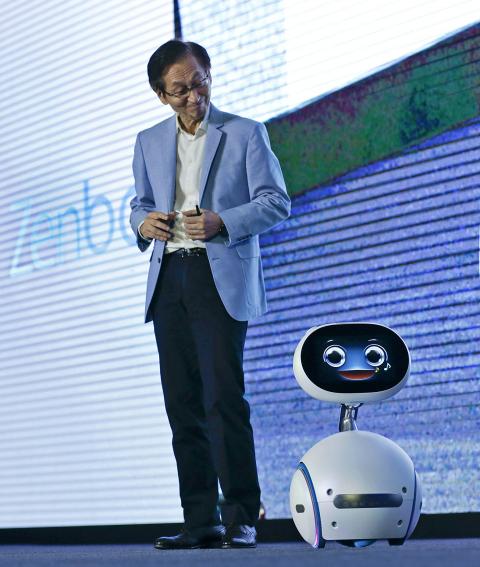Asustek Computer Inc (華碩) yesterday introduced its first voice-controlled home robot as a “smart home manager,” officially tapping into the robotic sector.
“Our ambition is to enable robotic computing for every household,” Asustek chairman Jonney Shih (施崇棠) told a news conference in Taipei.
Zenbo, which is described as a “less-cute, real-world version of Star Wars’ BB-8 droid” by tech news site the Verge, can function as a kitchen assistant, security guard, companion for seniors or children, and a photographer.

Photo: EPA
Shih called on global hardware and software developers to join Asustek’s “developers’ program” to help create applications and content for Zenbo.
“Together we can make Zenbo the best and most practical robot for every household. Together we can work on the next chapter of proactive computing,” Shih said.
Compared with SoftBank Corp’s service humanoid robot Pepper, which is priced at ¥198,000 (US$1,782), Asustek’s home robot is “shorter” and cheaper at US$599.
No release date has been announced.
Asustek chief executive officer Jerry Shen (沈振來) told reporters on the sidelines of the event that Zenbo might not hit the market before the end of the year, as there is “still work to do and some adjustments to make.”
No other information regarding the specifications or manufacturing details of Zenbo were revealed, as Shih declined to take questions from reporters after the news event.
In addition to the introduction of Zenbo, Asustek launched three new models of its third-generation ZenFoen — the ZenFone 3, ZenFone 3 Deluxe and Zenfone 3 Ultra.
The three new models are mainly powered by Qualcomm Inc’s processor, as Asustek has gradually increased adoption of chips by Qualcomm, instead of Intel’s.
The change follows Intel’s withdrawal of its subsidy plan in the first half of last year.
The 5.5-inch ZenFone 3 starts from US$249, a similar price range to the ZenFone 2.
The higher-end 5.7-inch ZenFone 3 Deluxe and 6.8-inch ZenFone 3 Ultra are priced from US$479, a move that indicates Asustek’s attempt to increase the average sale price of its ZenFone.
Shen this month told investors that the company expects its smartphone shipment momentum to pick up significantly in the second half of this year, after the launch of the ZenFone 3 series.
Asustek aims to ship a total of 25 million smartphones this year, up 25 percent from last year’s 20 million, the company said.

Taiwan Semiconductor Manufacturing Co (TSMC, 台積電) would not produce its most advanced technologies in the US next year, Minister of Economic Affairs J.W. Kuo (郭智輝) said yesterday. Kuo made the comment during an appearance at the legislature, hours after the chipmaker announced that it would invest an additional US$100 billion to expand its manufacturing operations in the US. Asked by Taiwan People’s Party Legislator-at-large Chang Chi-kai (張啟楷) if TSMC would allow its most advanced technologies, the yet-to-be-released 2-nanometer and 1.6-nanometer processes, to go to the US in the near term, Kuo denied it. TSMC recently opened its first US factory, which produces 4-nanometer

PROTECTION: The investigation, which takes aim at exporters such as Canada, Germany and Brazil, came days after Trump unveiled tariff hikes on steel and aluminum products US President Donald Trump on Saturday ordered a probe into potential tariffs on lumber imports — a move threatening to stoke trade tensions — while also pushing for a domestic supply boost. Trump signed an executive order instructing US Secretary of Commerce Howard Lutnick to begin an investigation “to determine the effects on the national security of imports of timber, lumber and their derivative products.” The study might result in new tariffs being imposed, which would pile on top of existing levies. The investigation takes aim at exporters like Canada, Germany and Brazil, with White House officials earlier accusing these economies of

GREAT SUCCESS: Republican Senator Todd Young expressed surprise at Trump’s comments and said he expects the administration to keep the program running US lawmakers who helped secure billions of dollars in subsidies for domestic semiconductor manufacturing rejected US President Donald Trump’s call to revoke the 2022 CHIPS and Science Act, signaling that any repeal effort in the US Congress would fall short. US Senate Minority Leader Chuck Schumer, who negotiated the law, on Wednesday said that Trump’s demand would fail, while a top Republican proponent, US Senator Todd Young, expressed surprise at the president’s comments and said he expects the administration to keep the program running. The CHIPS Act is “essential for America leading the world in tech, leading the world in AI [artificial

REACTIONS: While most analysts were positive about TSMC’s investment, one said the US expansion could disrupt the company’s supply-demand balance Taiwan Semiconductor Manufacturing Co’s (TSMC, 台積電) new US$100 billion investment in the US would exert a positive effect on the chipmaker’s revenue in the medium term on the back of booming artificial intelligence (AI) chip demand from US chip designers, an International Data Corp (IDC) analyst said yesterday. “This is good for TSMC in terms of business expansion, as its major clients for advanced chips are US chip designers,” IDC senior semiconductor research manager Galen Zeng (曾冠瑋) said by telephone yesterday. “Besides, those US companies all consider supply chain resilience a business imperative,” Zeng said. That meant local supply would